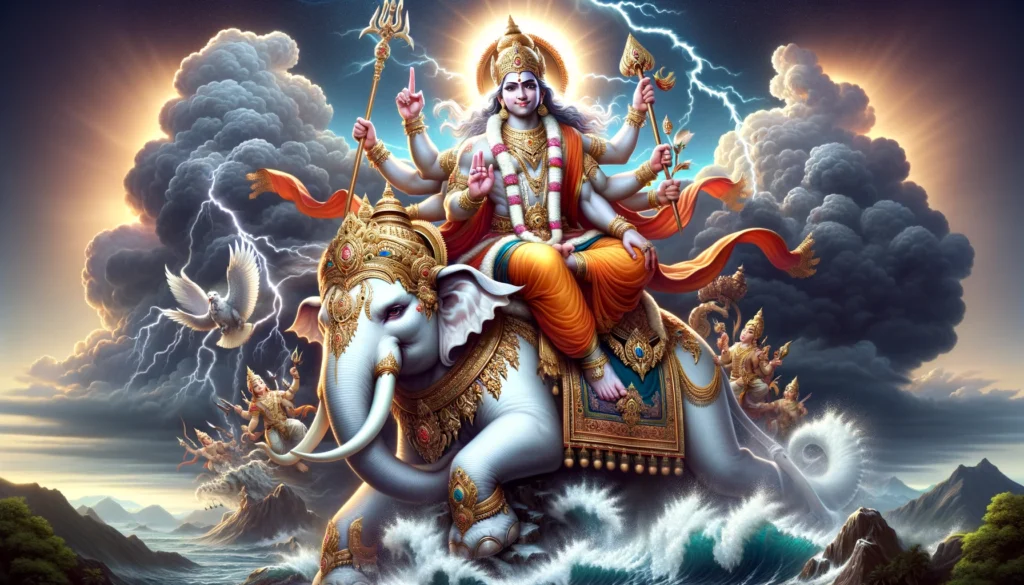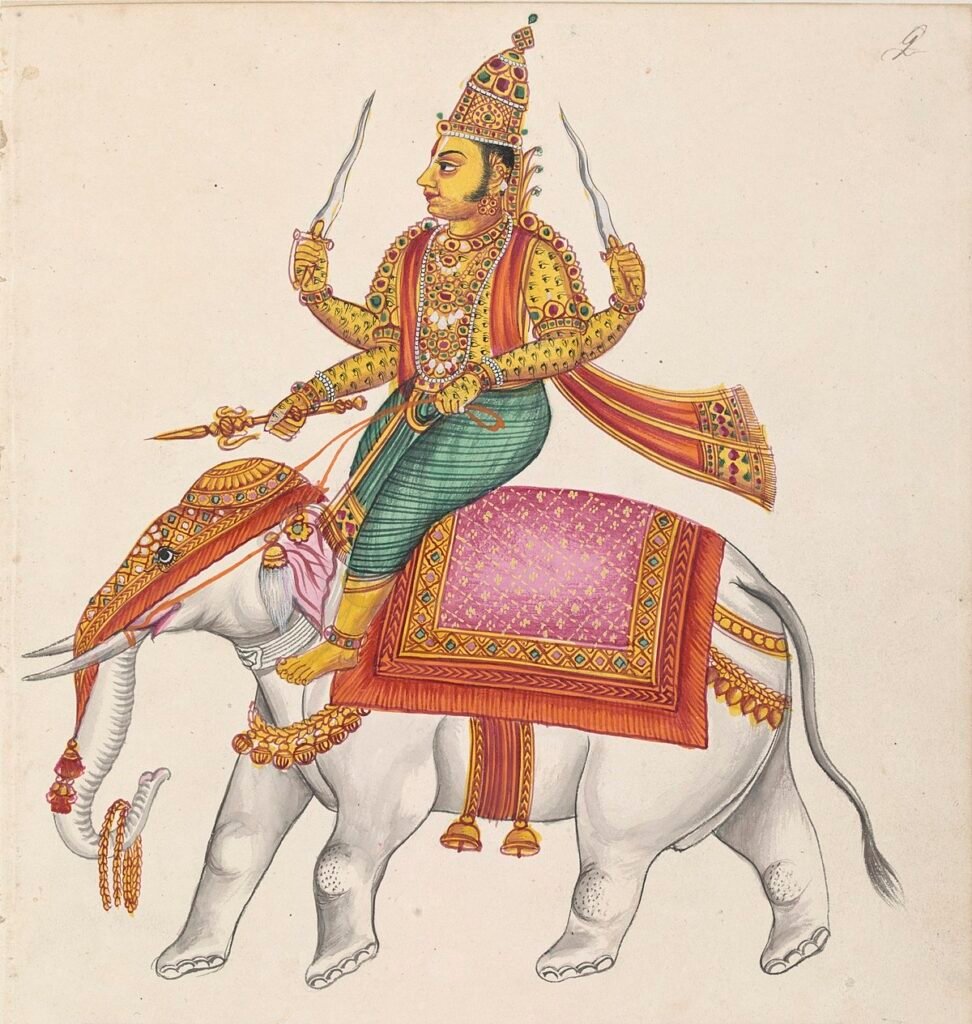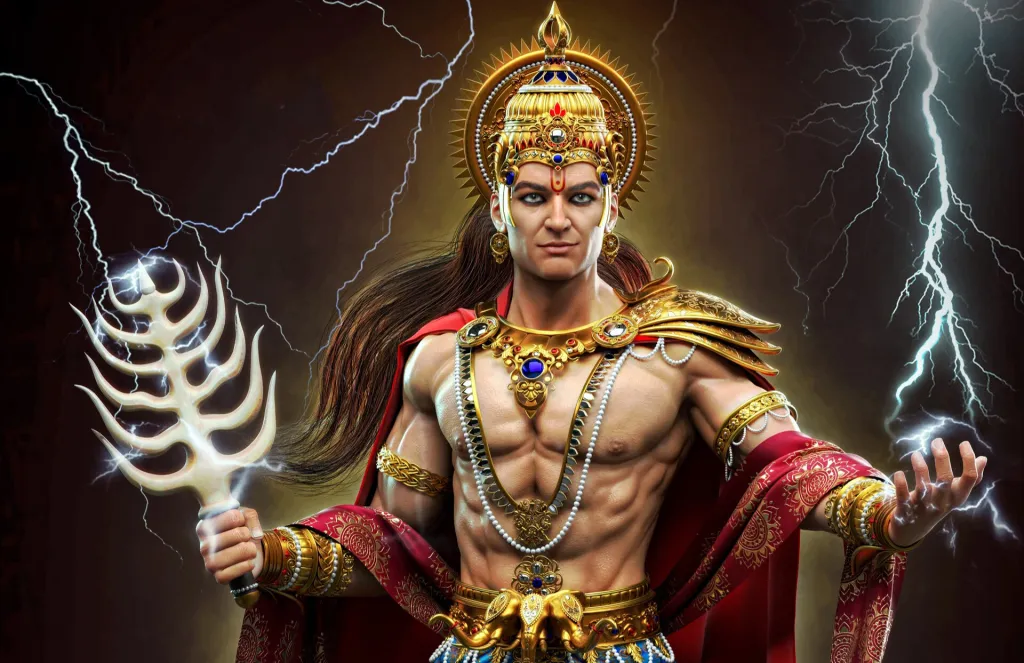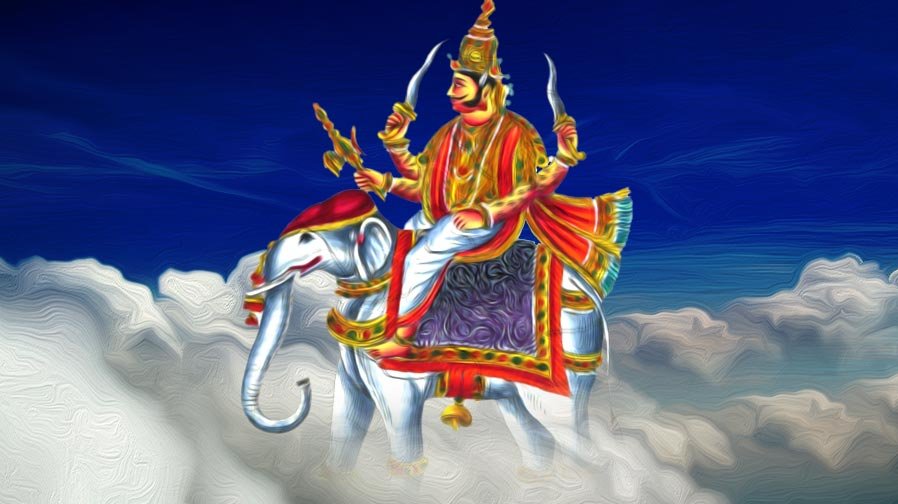In the vast and diverse pantheon of Hindu mythology, Indra occupies a pivotal role as the King of the Devas (gods) and the ruler of Svarga, the celestial realm or heaven. He is not only revered as the God of Rain and Thunderstorms but also as a powerful warrior deity who leads the forces of good against demons and forces of chaos. Though his influence has varied through different eras and texts, Indra remains one of the most well-known deities in Hinduism and Vedic literature.

Origins and Role in Vedic Literature
Indra’s prominence is most noticeable in the Rigveda, one of the oldest sacred texts of Hinduism. He is depicted as the mightiest of gods, often praised for his strength, valor, and protection of the cosmos. In the early Vedic period, Indra was regarded as the most significant deity, the one who controlled the rains, bestowed prosperity on the land, and ensured the proper balance between the forces of nature.
A famous story from the Rigveda tells of Indra’s battle with the demon Vritra, a cosmic serpent or dragon that blocked the rivers, causing drought. Armed with his mighty weapon, the Vajra (thunderbolt), Indra slayed Vritra, releasing the waters to flow freely and thus restoring life to the Earth. This act cemented his role as a savior of mankind, a symbol of cosmic order over chaos, and the bringer of rains that nourished the land.

Iconography and Symbolism
Indra is often depicted as a muscular, regal figure, riding a white elephant named Airavata, which symbolizes strength and wisdom. He holds his Vajra in one hand, a symbol of his ability to harness the power of lightning and thunder. His association with the rain makes him a deity of great importance in agrarian societies, as his blessings ensured bountiful harvests.
Indra’s abode is Amaravati, a magnificent palace in Svarga, located on the peak of Mount Meru. This heavenly kingdom is described as a place of eternal bliss, where the gods and divine beings reside. As the ruler of heaven, Indra presides over the affairs of the gods, ensuring that the celestial balance is maintained.
Indra’s Complex Personality
While Indra is a revered god, his character is complex and multifaceted. He is known for his bravery and heroic deeds, but he also exhibits qualities such as pride, jealousy, and desire. These human-like flaws make him a relatable figure in Hindu mythology, as he navigates challenges and temptations that often reflect the struggles of human existence.
One well-known story from the Mahabharata describes how Indra, disguised as a Brahmin, approaches Karna, a great warrior, to ask for his divine armor and earrings. Karna, known for his generosity, agrees to give them up, even though they are his source of invincibility. This episode demonstrates Indra’s tactical cunning but also his reverence for dharma (righteousness), as he later rewards Karna for his selfless act.

Decline in Prominence
In later Hindu traditions, especially with the rise of gods like Vishnu and Shiva, Indra’s prominence diminished. Though still respected as a god of the heavens, he became more of a secondary figure in comparison to these supreme deities who gained prominence in the post-Vedic Puranic era. Indra’s stories shifted towards those of learning humility, as seen in the tale of Govardhan Hill, where Lord Krishna lifts the hill to protect villagers from Indra’s wrath, ultimately teaching him the importance of compassion and humility.
Indra’s Role in Buddhist and Jain Traditions
Interestingly, Indra also plays a significant role in Buddhist and Jain traditions. In Buddhist cosmology, he is known as Śakra or Sakka and is regarded as the protector of the Buddha and the Dharma. His role in Buddhism is more moralistic and often represents virtue and leadership. In Jainism, Indra is depicted as a god who celebrates the birth of Tirthankaras, the enlightened spiritual teachers.
Indra in Modern Context
Today, Indra may not be worshipped as widely as he once was, but his influence is still felt in various cultural and religious practices. He is invoked in prayers for rain and protection, and festivals like Indra Jatra in Nepal celebrate him as the god of rain and the king of heaven. His stories and legends continue to inspire, symbolizing the balance between the forces of nature and human endeavors.

Conclusion
Indra’s place in Hindu mythology is deeply intertwined with the cosmic balance of power, nature, and divine leadership. As the god of thunder, rain, and heaven, he represents both the benevolence and the might of the gods. His tales of bravery, wisdom, and humility continue to resonate, offering lessons of strength, protection, and the ever-present need for balance in life. Indra’s legacy, though evolved, remains a testament to his enduring influence in Indian mythology and spirituality.
